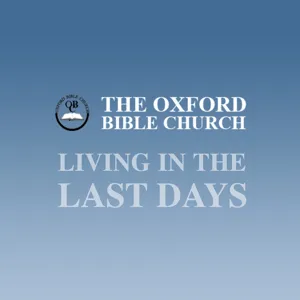GALATIANS #10: Keep in Step with the Spirit, Ga. 5:16–26

Explore "law of moses" with insightful episodes like "GALATIANS #10: Keep in Step with the Spirit, Ga. 5:16–26", "GALATIANS 09: Christ has Set us Free, Ga. 5:1–15", "One Year Bible: February 7th, 24: Perfect Cleansing: Understanding the Symbolism of Sacrifice and Atonement in Christianity", "GALATIANS #04: Paul Opposes Peter & Justified by Faith, Galatians 2:11-21" and "Doctrine of Christ Part 9 3.1.23" from podcasts like ""The Bible Study Program (audio)", "The Bible Study Program (audio)", "Daily Radio Bible Podcast", "The Bible Study Program (audio)" and "World Harvest Pentecostal Church Sunday Sermon"" and more!



One Year Bible Podcast: Join Hunter and Heather Barnes on 'The Daily Radio Bible' for a daily 20-minute spiritual journey. Engage with scripture readings, heartfelt devotionals, and collective prayers that draw you into the heart of God's love. Embark on this year-long voyage through the Bible, and let each day's passage uplift and inspire you.
TODAY'S EPISODE:
Discover the powerful message of perfect cleansing and freedom from guilt in today's Daily Radio Bible with Hunter Barnes. Uncover the profound meaning behind the ancient sacrifices and how they point to the ultimate sacrifice of Jesus. Embrace the life-changing truth that you have been made right with God through the perfect lamb. Find inspiration to live each day in the light of your new identity and the gracious life offered to you.
TODAY'S PRAYERS:
Lord God Almighty and everlasting father you have brought us in safety to this new day preserve us with your Mighty power that we might not fall into sin or be overcome by adversity. And in all we do, direct us to the fulfilling of your purpose through Jesus Christ Our Lord amen.
Oh God you have made of one blood all the peoples of the earth and sent your blessed son to preach peace to those who are far and those who are near. Grant that people everywhere may seek after you, and find you. Bring the nations into your fold, pour out your Spirit on all flesh, and hasten the coming of your kingdom through Jesus Christ our Lord, Amen.
And now Lord, make me an instrument of your peace. Where there is hatred let me sow love. Where there is injury, pardon. Where there is doubt, faith. Where there is despair, hope. Where there is darkness, light. And where there is sadness, Joy. Oh Lord grant that I might not seek to be consoled as to console. To be understood as to understand, to be loved as to love. For it is in the giving that we receive, in the pardoning that we are pardoned, it is in the dying that we are born unto eternal life. Amen
And now as our Lord has taught us we are bold to pray...
Our Father who art in heaven, hallowed be thy name, they kingdom come thy will be done on earth as it is in heaven, give us this day our daily bread, and forgive us our tresspasses as we forgive those who trespass against us, and lead us not unto temptation, but deliver us from evil, for thine is the Kingdom and the power and the glory forever. Amen.
Loving God, we give you thanks for restoring us in your image. And nourishing us with spiritual food, now send us forth as forgiven people, healed and renewed, that we may proclaim your love to the world, and continue in the risen life of Christ. Amen.
OUR WEBSITE: www.dailyradiobible.com
We are reading through the New Living Translation.
Leave us a voicemail HERE: https://www.speakpipe.com/dailyradiobible
Subscribe to us at YouTube: https://www.youtube.com/@Dailyradiobible/featured
OTHER PODCASTS:
Listen with Apple Podcast










In part 3 of What is the Gospel? we look at the gospel as revealed in the blessings and curses of obedience and disobedience to the Torah. We also see the gospel as it relates to the reunification of the whole nation of Israel, returning the House of Israel and merging it with the House of Judah with the new covenant.

In part 2 of What is the Gospel? we look at the gospel according to Paul. What is it and what is the righteousness that is by faith? We then take a look at the gospel message of obedience. Join us as we examine these questions in further detail continuing our journey in understanding all of the gospel.
(Please Note: This is now Part 2 of 5, different from the original version of the What is the Gospel Teaching)





Stay up to date
For any inquiries, please email us at hello@podcastworld.io